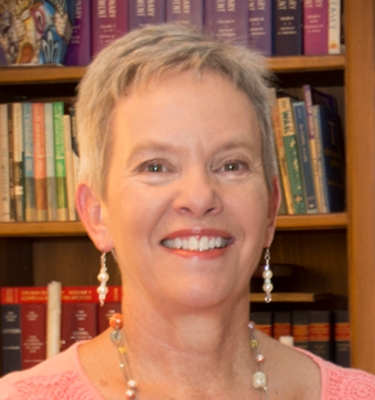Depending on your personal interests and preferences, you may want to major in early childhood, elementary, or secondary education. If you desire to work in a field where you can make a positive impact on people’s lives, then you might consider an online bachelors in education.

If you love working with children or teenagers, you may want to become a teacher. With experience and further education, you might even advance to a position as a school principal or instructional coordinator.
Editorial Listing ShortCode:
Earning a bachelors in education online involves coursework in curriculum and instructional strategies, psychology of cognition and development, classroom technology, and more.
Online Bachelors in Education Degrees
As an education major, you may specialize in a degree program that focuses on the knowledge and skills you’ll need to teach students at specific age or grade levels. Depending on your personal interests and preferences, you may want to major in early childhood, elementary, or secondary education.
Select the program that most interests you to jump to that section of the guide:
Regardless of the specialty you select, you will still receive a strong foundation in education and related courses.
Early Childhood Education

If you love working with little children, your enthusiasm for teaching little ones may lead you to major in early childhood education.
This degree program focuses on knowledge and skills for teaching children from infancy to age 8, which includes childcare and preschool through second grade. As an early childhood education major, you may take many courses that help you develop an understanding of how young children learn and develop.
You coursework would likely include courses in curriculum and instruction, classroom technology, early childhood developmental psychology, philosophy of education, behavior management, and more.
Editorial Listing ShortCode:
Early childhood teachers help young children accomplish academic learning appropriate to their age and grade level as well as learn social skills and develop motor skills.
After completing a bachelors in early childhood education online, you might become a teacher or director at a daycare center. You may also become a classroom teacher in preschool through second grade at a public or private school.
Elementary Education

If you’d prefer to teach children who are beyond the toddler and early childhood stages, you might consider earning a bachelors in elementary education online. With this degree, you may teach in kindergarten through elementary grades.
Teachers in these grade levels typically deliver instruction in multiple subject areas, including language arts, reading, science, math, and social studies.
Editorial Listing ShortCode:
Through coursework, research, and field experience, you may learn about child development, classroom management, curriculum planning, educational technology, and instructional strategies for teaching in elementary schools. Some teachers with elementary education degrees teach in middle schools too.
An online bachelor’s degree in elementary education program may equip you to serve as a leader in elementary education. It may also benefit you to look into continuing on with an online masters in education, or from a traditional program, if you would like to one day become a school principal.
You may collaborate with parents, colleagues, and school administrators to enrich the learning environment for elementary school children. In this way, you may help children set the stage for future life success.
Secondary Education

To teach in a middle school or high school, you might pursue an online bachelors degree in secondary education.
Teachers on this level generally do not teach multiple subjects. Instead, they work in school departments where they teach subjects in a single academic area. For this reason, secondary education degree programs tend to offer specialized training.
For example, you may pursue a bachelors degree in history for secondary education, English for secondary education, or biology for secondary education.
Editorial Listing ShortCode:
Each of these degree programs features significant coursework and research in the specific subject area along with teacher preparation courses, field experience, and student teaching.
Teachers with degrees in secondary education may be employed in public or private middle schools or high schools. Some teachers choose to work with adult literacy programs, where students work toward high school equivalency diplomas.
Bachelor’s in Education Careers & Salaries
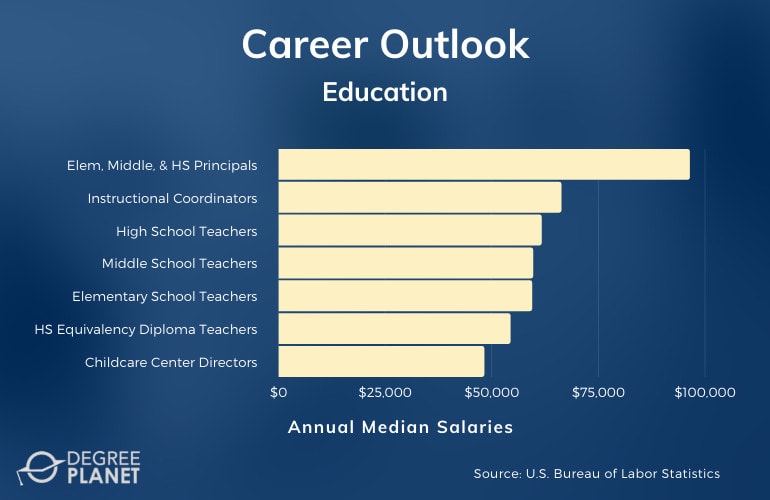
After completing your bachelors in education, you may serve as a teacher in public or private schools, or you may become a childcare worker or childcare center director. The table below shows teaching jobs in various settings for specific age and grade levels.
The Bureau of Labor Statistics reports the following median annual salaries for career paths you may pursue with a degree in education.
| Careers | Annual Median Salaries |
| Elementary, Middle, and High School Principals | $98,490 |
| Instructional Coordinators | $66,970 |
| High School Teachers | $62,870 |
| Middle School Teachers | $60,810 |
| Kindergarten and Elementary School Teachers | $60,660 |
| Adult Literacy and High School Equivalency Diploma Teachers | $55,350 |
| Preschool and Childcare Center Directors | $49,160 |
| Tutors | $40,590 |
| Preschool Teachers | $31,930 |
| Childcare Workers | $25,460 |
The jobs of school principal and instructional coordinator require at least a masters degree. Many professionals in these positions also hold doctoral degrees.
If you want to become a school principal or instructional coordinator, you might start with your bachelors degree in education. From there, you may attend graduate school to advance into higher-paying, supervisory positions in the field of education.
Bachelor’s in Education Curriculum
A bachelor’s degree in education requires around 120 undergraduate credit hours. Education majors must complete a core curriculum of English, math, science, history, and humanities courses for general education purposes. This core curriculum comprises approximately 40 to 46 credit hours.
Editorial Listing ShortCode:
After completing their core courses, education majors move into coursework that is specific to teacher preparation. Here is a list of courses you might take for a bachelor’s in education:
- Psychology of Child Development: You’ll explore the characteristics of developmental stages in childhood, including cognitive, biological, social, and emotional development.
- Curriculum Development: You’ll learn to utilize standards and benchmarks to develop objectives, curricular scope and sequence, and meaningful assessments for student learning.
- Technology in the Elementary Classroom: You’ll learn to use digital and electronic technology to facilitate delivery of instruction and promote media literacy among students.
- Behavior Management in the Elementary Classroom: This course is a survey of behavior management techniques to establish positive classroom culture, organize materials and instructional activities, and manage students’ use of time in the classroom.
- Teaching Students with Disabilities: You’ll learn to implement instructional strategies and learning tools that facilitate the teaching of students with special needs.
- Field Experience and Student Teaching: For state teaching licensure, education majors are required to complete internships in public schools, where you’ll apply the knowledge and skills you’ve learned through coursework and research to teaching students in real-world settings.
- Foundations of Education: This course is an overview of the history, philosophy, current social issues, and governmental regulations pertaining to the field of education.
- Growth and Development in Adolescence: This course explores developmental characteristics of adolescents (ages 11 to 19), including cognitive, physical, social, and emotional stages of development.
- Teaching English in Secondary Schools: You’ll learn research-based strategies and skills for effectively delivering instruction in English and language arts to students in secondary schools.
- Teaching Math in Secondary Schools: This course is a survey of current instructional methods, curriculum, materials, and tools for teaching math to students in secondary schools.
This list is only a small sample of courses you may take for a bachelors in education.
Admissions Requirements

After you choose a college for your bachelor’s degree in teaching, your next step is to apply. Here is a list of general requirements for college admission:
- High school diploma or equivalent
- Minimum high school GPA
- Minimum scores on SAT or ACT test, if required
- Letters of recommendation
Many colleges require that your high school transcript shows completion of requisite courses in math, science, languages, and other academic subjects. If your GPA, test scores, or transcript of high school courses do not meet requirements, many colleges offer remedial scholars’ programs for you to acquire the skills for college-level work.
Accreditation
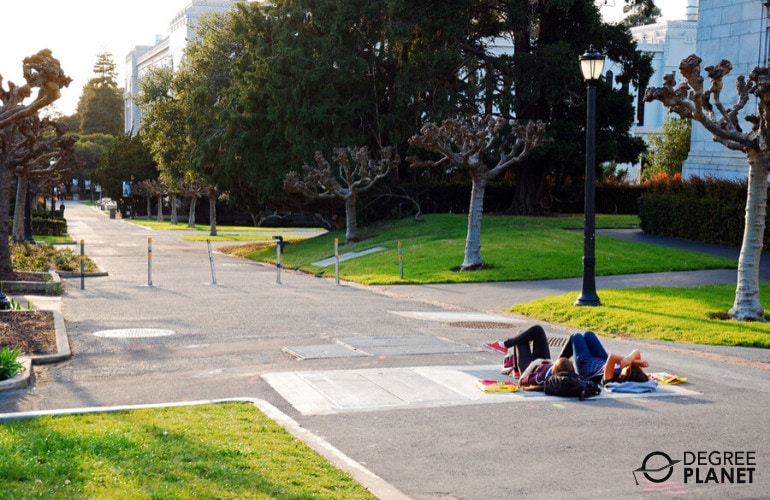
As you research colleges to pursue your online bachelor’s degree in education, you may want to keep an eye out for accredited education degree programs from regionally accredited colleges or universities.
In order to have regional accreditation, an institution must receive regional accreditation from one of these organizations:
- Accrediting Commission for Community and Junior Colleges (ACCJC) Western Association of Schools and Colleges
- Higher Learning Commission (HLC)
- Middle States Commission on Higher Education (MSCHE)
- New England Commission of Higher Education (NECHE)
- Northwest Commission on Colleges and Universities (NWCCU)
- Southern Association of Colleges and Schools Commission on Colleges (SACSCOC)
- WASC Senior College and University Commission (WSCUC)
It’s advantageous for education degree programs to also be accredited by the Council for the Accreditation of Educator Preparation (CAEP) or the American Association of Colleges for Teacher Education (AACTE).
A school’s regional accreditation status and a degree program’s teacher-preparation accreditation are both vital for licensure and for pursuing teaching jobs.
Financial Aid and Scholarships

You may seek financial aid and scholarships for earning your education degree online.
To start the process, you can visit the Federal Student Aid website, where you can fill out and submit your FAFSA form. You can explore the many forms of federal financial assistance, including loans, grants, merit-based and need-based scholarships, work-study jobs, and aid for military families.
Editorial Listing ShortCode:
In addition to federal aid, you might also explore scholarship programs from your state, employer, churches, and community organizations. College alumni groups may also provide scholarships, so you may check with the financial aid office at your university.
What Is a Degree in Education?

A degree in education can help prepare you to become a teacher. Depending on your specific interests, you might pursue an early childhood education degree for working with young children, an elementary education degree for teaching in elementary or middle schools, or a secondary education degree to become a high school teacher.
In your degree program, you may acquire a wealth of information and skills that can help equip you to effectively motivate and communicate with students in the classroom.
You may develop leadership skills, learn instructional strategies, and acquire an understanding of cognitive, social, and developmental factors that impact learning among children and teenagers.
What Can You Do with an Education Degree?

A bachelors degree in education may open doors to a teaching career in public or private schools. These include preschools, kindergarten, elementary schools, middle schools, and high schools.
You may also qualify to work in a childcare center as a teacher or a center director. In-person or online tutoring is also a potential occupation for teachers with bachelors degrees in education.
If you want to advance to higher-paying supervisory positions in education, your bachelors degree in education may serve as a springboard to masters and doctoral degrees. With a graduate degree, you may become a school principal or instructional coordinator.
Can You Get a Bachelors in Education Online?

You can get an education degree online, and if it comes from an accredited university, it will be just as valid as a degree earned through on-campus instruction.
You may take your college courses online and interact virtually with your professors and peers. You may then engage in field experiences and student teaching internships during the later semesters of your degree program.
Any accredited, online education program that offers a pathway to state licensure or certification for teaching will require field experience and internship in schools. As an online student, you may work with your professors to be placed in schools near your home for your field experience and internship.
A number of universities offer different online education degrees, from accelerated associate’s in education to an online doctorate in education without GRE requirements.
How Long Does It Take to Get a Bachelor’s Degree in Education?

An online bachelors degree in education allows you the flexibility to maintain job and family responsibilities while you work on your degree.
Depending on your individual circumstances, you might be able to enroll full-time in 16 week semester courses. At that rate, you may finish your degree in 4 years. If you enroll part-time, it may take you longer to finish the program.
On the other hand, you might attend a college that features 8 week semesters that continue on a year-round basis. If you’re able to enroll full-time in such a program, you may finish in less than 4 years.
Can You Get a Teaching Job with an Online Degree?
Yes, you can get a teaching job with an online degree as long as the college or university holds regional accreditation. The education degree program should also be accredited by a professional organization, such as CAEP or AACTE.
Editorial Listing ShortCode:
For a degree that leads to state teaching licensure, you’ll need to complete field experience and a student teaching internship in the final semesters of your degree program. This cannot be accomplished entirely online as you’ll need to complete these requirements in local schools.
What Degree Do You Need to Be a Teacher?

To become a licensed and certified teacher, you need at least a bachelors degree in education.
If you’re interested in teaching high school students, you may want to pursue a bachelors in secondary education. For teaching in grades 4 through 8, many colleges offer middle grades education degrees.
Perhaps you’d like to work with younger children. A bachelor’s degree in elementary education may lead to a job teaching children in kindergarten through elementary school. An early childhood education degree focuses on teaching younger children, from birth to age 8.
Is an Education Degree a BA or BS?

A Bachelor of Arts degree typically requires more courses in English, literature, history, philosophy, and humanities. A Bachelor of Science degree focuses more on science, math, and technology courses. Many education degrees are BS in Education degrees.
Other education degrees are granted as BA degrees. This is particularly true for secondary education degrees, such as BA in History for Secondary Education or BA in English for Secondary Education.
Is a Bachelors in Education Worth It?

Yes, a bachelor’s degree in education is worth it for many students. The Bureau of Labor Statistics is projecting 5% job growth in education, training, and library occupations over the next 10 years.
Common education careers in this field include high school teacher, middle school teacher, elementary school teacher, preschool teacher, and daycare center director.
Universities Offering Online Bachelors in Education Degree Programs
Methodology: The following school list is in alphabetical order. To be included, a college or university must be regionally accredited and offer degree programs online or in a hybrid format.
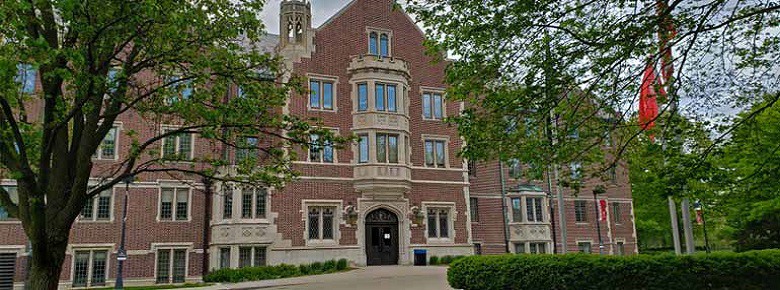
The Bachelor of Science in Early Childhood Education program from Ball State University is a non-licensure program that teaches students to work with children from the time of birth through age 5. Students will learn about professional conduct, teaching and learning, building family relationships, and promoting positive childhood development.
Ball State University is accredited by the Higher Learning Commission.
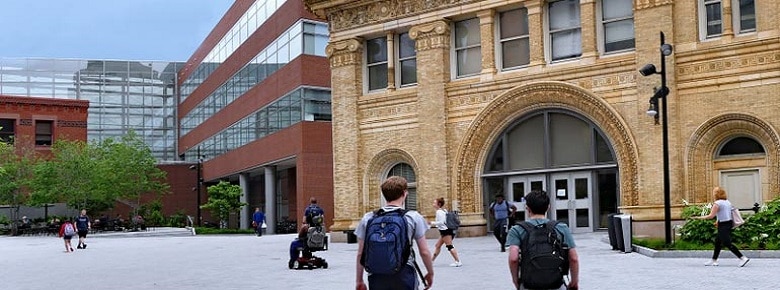
Drexel University offers bachelors degrees in education (non-certification track) and elementary education.
Students in the elementary education program can potentially earn both K-4 and special education certifications. The curricula in both programs feature classes in child development, literacy, and educational pedagogy. The non-certification track better prepares students for graduate school.
Drexel University is accredited by the Middle States Commission on Higher Education.
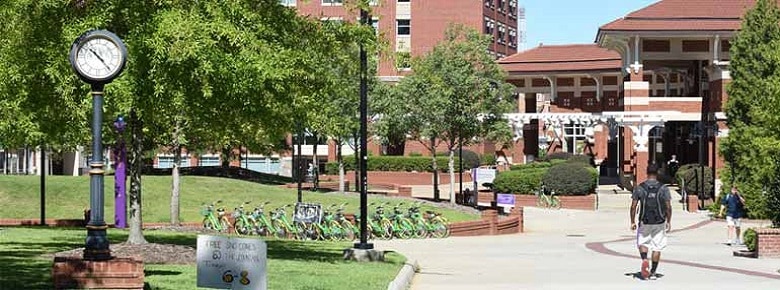
Students hoping to educate young children can enroll in East Carolina University’s Bachelor of Science in Birth-Kindergarten Teacher Education program.
The program can be undertaken on-campus or online, but the online program is only available to residents of North Carolina. Course topics include educational technology, diversity, and assessment for intervention.
East Carolina University is accredited by the Commission on Colleges of the Southern Association of Colleges and Schools.

Florida International University’s Bachelor of Science in Early Childhood Education program is 100% online and doesn’t lead to teacher certification.
Students will learn to encourage the holistic development of children. Courses also place heavy emphasis on general and early education practices and theories as well as on children’s language, social, and cognitive needs.
Florida International University is accredited by the Southern Association of Colleges and Schools Commission on Colleges.
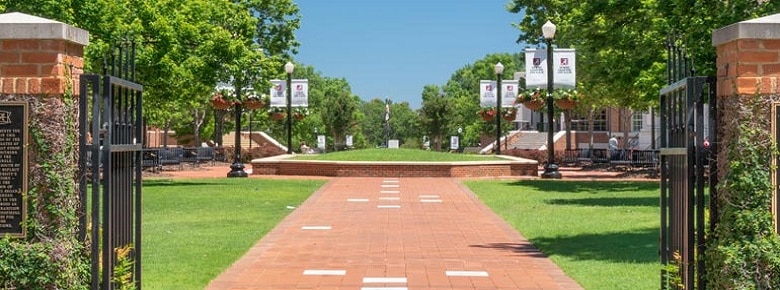
The early childhood education bachelors program from University of Alabama is a 120 credit program, and 30 of those credits must be earned at UA. In addition to electives, general education, and core courses, students will also complete six hour internships.
The University of Alabama is accredited by the Southern Association of Colleges and Schools Commission on Colleges.

Students enrolled in the CAEP accredited early childhood education bachelors program at University of Cincinnati will learn to nurture children’s (birth to 5) early language development skills, work effectively with children with disabilities or special needs, build strong family relationships, and develop as early childhood educational leaders.
The program doesn’t lead to licensure.
The University of Cincinnati is accredited by the Higher Learning Commission.
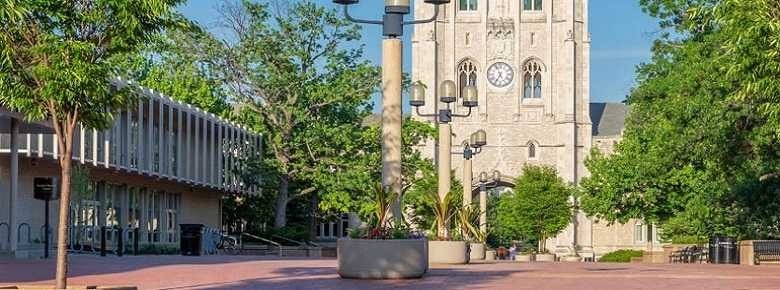
Students at the University of Missouri – Columbia interested in education can enroll in the school’s Bachelor of Educational Studies with a concentration in Interdepartmental Studies.
The program is accredited by the Teacher Education Accreditation Council and is entirely online. Courses include career guidance, human learning, project management, and leadership.
The University of Missouri – Columbia is accredited by the Higher Learning Commission.

University of Nebraska – Lincoln offers a Bachelor of Science program in child, youth, and family studies that features a concentration in early childhood in a mobile society. The program is designed specifically to teach students to work with and educate children ages birth to 8 whose families relocate often.
The University of Nebraska-Lincoln is accredited by the Higher Learning Commission.

The Bachelor of Science in Elementary Education program at University of Southern Mississippi is designed specifically for students already working as teachers’ assistants in the state of Mississippi. It’s an alternative route to licensure for full-time employees who hope to become teachers but can’t currently leave their TA jobs for college.
The University of Southern Mississippi is accredited by the Southern Association of Colleges and Schools Commission on Colleges.
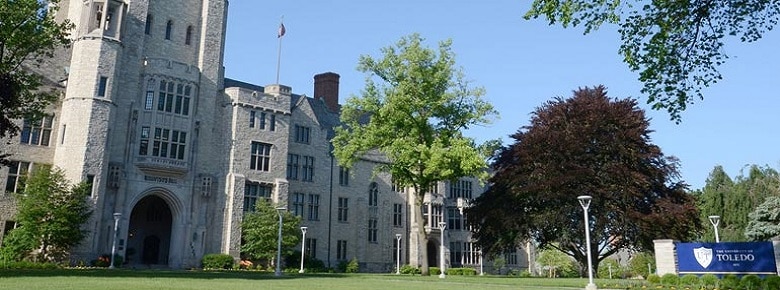
University of Toledo offers a non-licensure early childhood education fast track program that allows students with associates degrees to earn their bachelors degrees online by taking only 16 credits a semester for only 4 semesters. Courses include effective learning environments, supporting science and mathematics, and children with disabilities.
The University of Toledo is accredited by the Higher Learning Commission.
Getting Your Bachelors in Education Online

Most educators are interested in making a positive impact on the lives of children or teenagers. If you’ve ever benefited from knowing an excellent teacher, you may want to pay it forward by becoming an educator.
By now, you might be ready to explore accredited universities and bachelor’s in education online programs. Earning your degree through an excellent virtual learning platform offered by a reputable school may open doors to exciting and rewarding careers. Plus, if you want to further your education even more, a growing number of schools now offer online masters in education without GRE requirements for admission!

